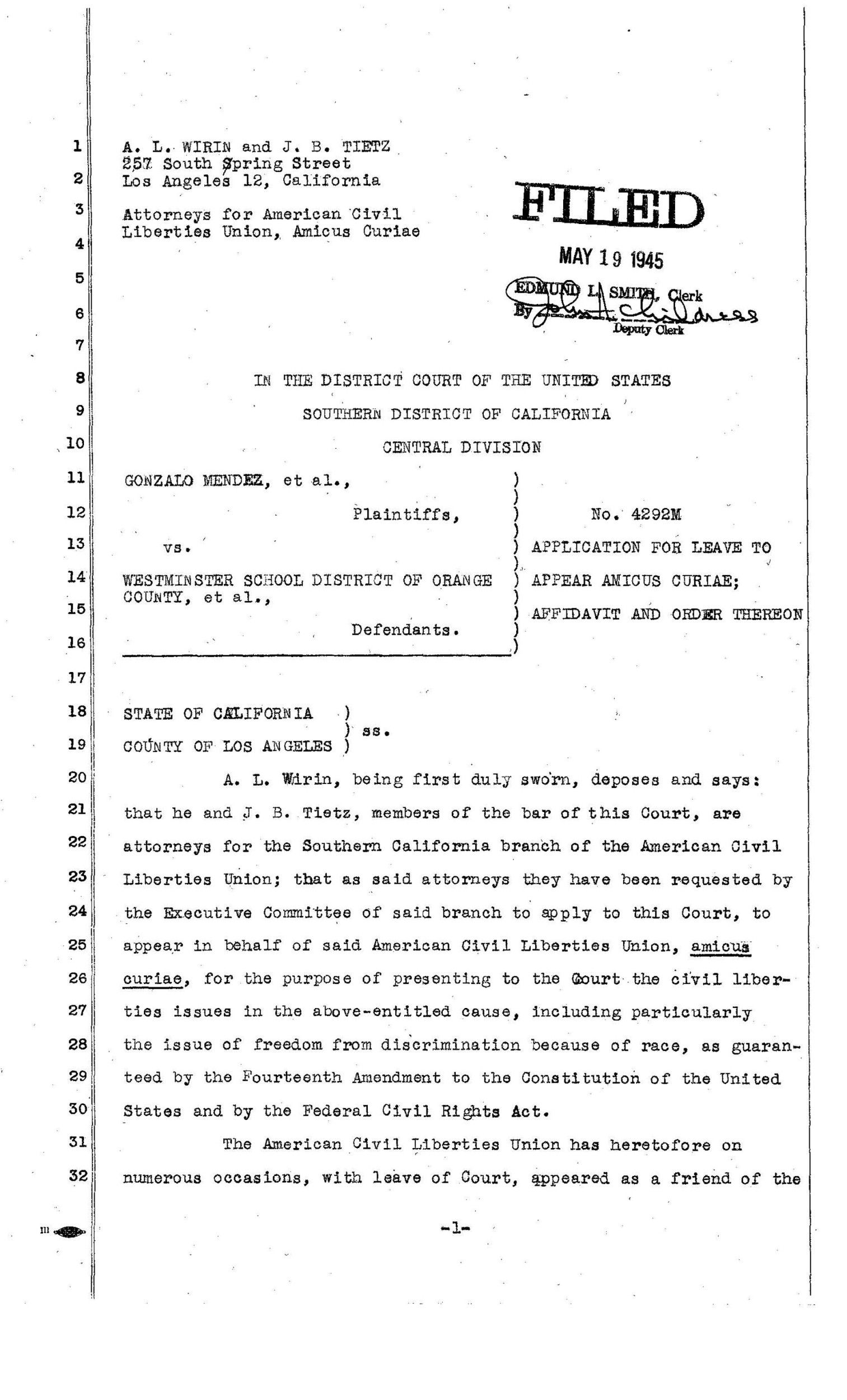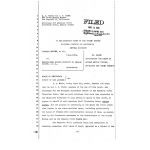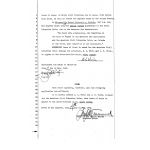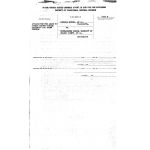Application from the ACLU to Appear Amicus Curiae
5/19/1945
Add to Favorites:
Add all page(s) of this document to activity:

Add only page 1 to activity:
Add only page 2 to activity:
Add only page 3 to activity:
The American Civil Liberties Union (ACLU) submitted this application to appear amicus curiae - as an impartial advisor or "friend of the court" – in the case Mendez v. Westminster School District. They wished to present the civil liberties issues in the case, including freedom from discrimination because of race.
In the Fall of 1944, Gonzalo and Felicitas Mendez had tried to enroll their children in the Main Street School in Orange County, California. However, the school district had drawn boundary lines that excluded Mexican neighborhoods. The Mendez children were assigned to Hoover Elementary School, which was established for Mexican children.
Other Orange County Latino parents faced similar situations with their children. With the help of the United Latin American Citizens (LUCAC), they joined with the Mendez family and sued four local school districts – Westminster, Garden Grove, and El Modeno School Districts and the City of Santa Ana – for segregating their children and 5,000 others.
The petition from the parents stated that the schools were violating students' civil rights by segregating students of "Mexican and Latin" ancestry in separate schools.
Amicus curiae briefs were filed in the case by several other civil rights organizations in addition to the ACLU, including the NAACP (coauthored by Thurgood Marshall), American Jewish Congress, Japanese American League, and the National Lawyers Guild.
U.S. District Court Judge Paul J. McCormick concurred with the petitioners, issuing an injunction against the school districts' segregation policies. He stated that there was no justification in the laws of California to segregate Mexican children and that doing so was a "clear denial of the equal protection clause of the 14th Amendment."
The school districts filed an appeal, partly on the basis of a states' rights strategy. The U.S. Ninth Circuit Court upheld the District Court ruling in 1947, and the Orange County school districts dropped the case.
Mendez v. Westminster School District landed an important blow to school segregation in California. It underscored that the struggle for civil rights in America crossed regional, racial, and ethnic lines. The case resulted in the California legislature passing the Anderson bill, a measure that repealed all California school codes mandating segregation. The bill was signed by Governor Earl Warren.
In the Fall of 1944, Gonzalo and Felicitas Mendez had tried to enroll their children in the Main Street School in Orange County, California. However, the school district had drawn boundary lines that excluded Mexican neighborhoods. The Mendez children were assigned to Hoover Elementary School, which was established for Mexican children.
Other Orange County Latino parents faced similar situations with their children. With the help of the United Latin American Citizens (LUCAC), they joined with the Mendez family and sued four local school districts – Westminster, Garden Grove, and El Modeno School Districts and the City of Santa Ana – for segregating their children and 5,000 others.
The petition from the parents stated that the schools were violating students' civil rights by segregating students of "Mexican and Latin" ancestry in separate schools.
Amicus curiae briefs were filed in the case by several other civil rights organizations in addition to the ACLU, including the NAACP (coauthored by Thurgood Marshall), American Jewish Congress, Japanese American League, and the National Lawyers Guild.
U.S. District Court Judge Paul J. McCormick concurred with the petitioners, issuing an injunction against the school districts' segregation policies. He stated that there was no justification in the laws of California to segregate Mexican children and that doing so was a "clear denial of the equal protection clause of the 14th Amendment."
The school districts filed an appeal, partly on the basis of a states' rights strategy. The U.S. Ninth Circuit Court upheld the District Court ruling in 1947, and the Orange County school districts dropped the case.
Mendez v. Westminster School District landed an important blow to school segregation in California. It underscored that the struggle for civil rights in America crossed regional, racial, and ethnic lines. The case resulted in the California legislature passing the Anderson bill, a measure that repealed all California school codes mandating segregation. The bill was signed by Governor Earl Warren.
This primary source comes from the Records of District Courts of the United States.
National Archives Identifier: 6277730
Full Citation: Application for Leave to Appear Amicus Curiae (ACLU); 5/19/1945; Civil Case File 4292; Gonzalo Mendez et al v. Westminster School District of Orange County et al, 3/2/1945 - 7/18/1947; Civil Case Files, 1938 - 1995; Records of District Courts of the United States, Record Group 21; National Archives at Riverside, Perris, CA. [Online Version, https://docsteach.org/documents/document/aclu-amicus-curiae-application, April 19, 2024]Rights: Public Domain, Free of Known Copyright Restrictions. Learn more on our privacy and legal page.






